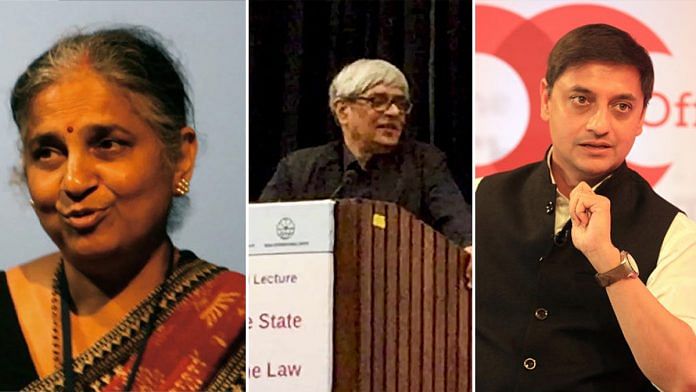New Delhi: The central government has set in motion the final stage in the process to revise the school syllabus and develop new NCERT textbooks by notifying a committee that has as members, author and philanthropist Sudha Murty, Prime Minister’s Economic Advisory Council (EAC-PM) chairman Bibek Debroy, EAC-PM member Sanjeev Sanyal, RSS ideologue Chamu Krishna Shastry, and singer Shankar Mahadevan.
Mahesh Chandra Pant, chancellor of the National Institute of Educational Planning and Administration (NIEPA), has been made the chairperson of the 19-member National Syllabus and Teaching Learning Material Committee (NSTC), which was notified by the National Council of Educational Research and Training (NCERT), an autonomous government organisation, on 21 July, ThePrint has learnt.
On 28 July, the National Curriculum Framework for School Education (NCF-SE), which outlines the broad contours for changes in school syllabus in line with the National Education Policy 2020, was submitted to Union Education Minister Dharmendra Pradhan.
The NCF-SE was finalised by a 21-member steering panel, which was formed in September 2021 and chaired by former Indian Space Research Organisation (ISRO) chairperson K. Kasturirangan.
Apart from chairperson Pant, Fields Medal recipient and Princeton University professor Manjul Bhargava and IIT-Gandhinagar visiting professor Michel Danino, who are in the new NSTC, were members of the NCF steering panel.
NSTC member Shastry is also the chairman of the Centre’s high-powered committee for the promotion of Indian languages — Bharatiya Bhasha Samiti.
According to the 21 July NCERT notification, the new committee shall use the NCF-SE as the “reference point and the guiding roadmap for the syllabus and textbook developers for school education all over the country”.
The government has previously said that it intends to introduce new textbooks from the 2024-25 academic session.
The “high-powered National Syllabus and Teaching Learning Material Committee” has been “empowered to develop the school syllabus, textbooks, and teaching learning materials for classes 3-12 (and to appropriately revise the existing textbooks of class 1 and 2 to ensure smooth transition from class 2 to 3)”, the notification stated.
While the final NCF has not been released in the public domain, the draft had suggestions on introducing board exams twice a year, dividing subjects into eight curricular areas for Class 10 students, and ending science, arts or humanities and commerce streams for higher secondary students to bring about structural changes in school education.
The terms of reference for the NSTC state that the textbooks and other learning materials that will be developed by the committee shall be published and distributed by the NCERT. The NSTC has also been authorised to set up sub-groups called curricular area groups to develop textbooks for every subject included in the school syllabus.
The NCERT textbooks currently in circulation are all prepared based on the 2005 NCF.
Academic-turned-activist Yogendra Yadav and political scientist Suhas Palshikar were among the members of the textbook development committee set up by the erstwhile United Progressive Alliance (UPA) government at the Centre to develop the school syllabus according to the 2005 NCF.
In June, Yadav and Palshikar wrote to the NCERT, requesting that their names be dropped from the textbooks they had helped develop as the “text has been mutilated beyond recognition”.
They were referring to deletions — such as portions on Mahatma Gandhi’s assassination and the ban on the Rashtriya Swayamsevak Sangh (RSS) — from political science textbooks by the NCERT under a “rationalisation” exercise.
(Edited by Nida Fatima Siddiqui)



